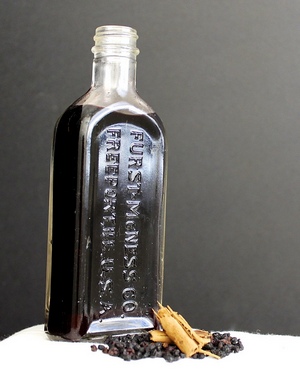The Ancient Medicine Chest
October 15, 2022
Elderberry has been well-known and highly respected throughout much of recorded history.
Hippocrates, the father of modern medicine, called it his “medicine chest”. Galen agreed with him.

From the Leechbook of Bald we have the following:
For foot ache, take leaves of elder and waybroad and mugwort, pound, lay on, and bind on.
A salve : take blooms of elder, and the crop, or bunch or umbel, boil them in butter, and smear
therewith
For the half dead the following is recommended:
take blossoms of elder, and rub them, and mix them with honey, and put them in a box, and when need be, take a bowl full of clear sweetened wine, mingle with that and strain : administer.
Let's take a closer look at that last one. What could it have been used for? Elderberry was used to help alleviate symptoms of chest congestion and as a diaphoretic (sweat inducer). Honey has several health benefits including easing coughing. White wine was used as a fever reducer. My guess is that we're probably looking at a preparation to support someone through a bout of the flu. "Half- dead" is a fairly good description of how the flu makes me feel.

What Bald is describing could have been made as either infused honey or an electuary. He would have taken elder blossoms. The amount probably wasn't critical. It would have depended on how much elder was available or how much of the preparation was wanted.
If infused honey was wanted, either fresh or dried blossoms could be used. Fresh blossoms would have been bruised and placed in a container. He calls for a box. A jar would be the modern equivalent. Add enough honey to cover the herbs by at least an inch. Put it in a cool dark spot for at least two weeks. Swirl it once or twice every day.
An electuary uses more herb and less honey. Bald would have powdered the dried elderflowers and added just enough honey to make a paste. Mixed thoroughly and transferred to a food safe container, this preparation had the advantage of travelling well. It would have been added to sweetened white wine, strained and drunk.
Oxymel is an ancient greek remedy made of honey and acid. The basic recipe is 4 parts honey to 1 part apple cider vinegar. Appropriate herbs could be steeped in it to treat different discomforts.
Here's a recipe for a fermented elderberry oxymel.
Gerard, in his Herball, apparently considers the plant so well-known that he compares many other plants against it in description. He recommends its use as a purgative with few negative effects. It's true that all parts except the ripe berry contain cyanic glycosides, which are responsible for its toxicity. The effect of small doses is to cause vomiting. So far in my research, all reported human cases of poisoning (which showed itself as vomiting) were treated and released with no lasting ill effects so that would seem to be a valid use. Do me a favor, though- please don't be the exception to the rule. If you feel you need a purgative, call a doctor.
Today, we use elderberry for relief against colds and flu. There is some evidence that it's also a diuretic. The modern research outlined in this PDF bears these uses out.
Syrup is often put forth as the best way to get the benefits from elderberry, although there is some question as to whether you can get a useful concentration of the active principles at home. If you've ever tasted elderberry syrup, you'll agree it's worth a try.
By the way, this gentleman's site is well worth a look. I linked to a number of his recipes in yesterday's post and I find myself back at it today. Here's his home page.

This herb was so highly regarded that it, as far as I can tell, every great herbalist in history relied on it. I found so much information on it and so many recipes for its use that I will likely revisit it in another post.
Thanks for stopping by!
